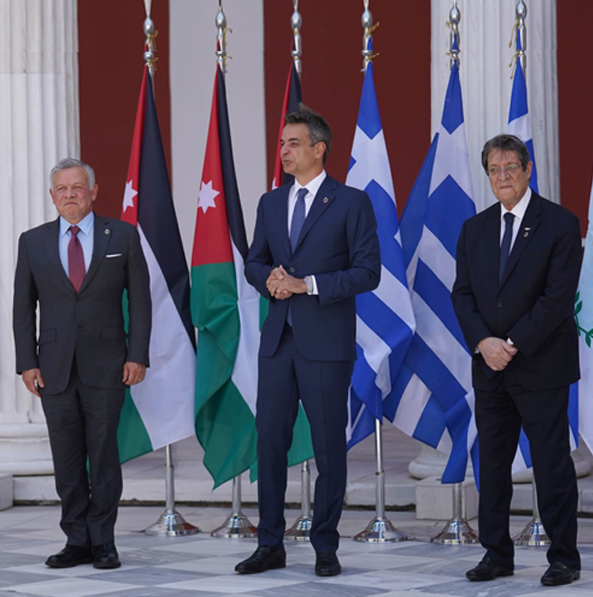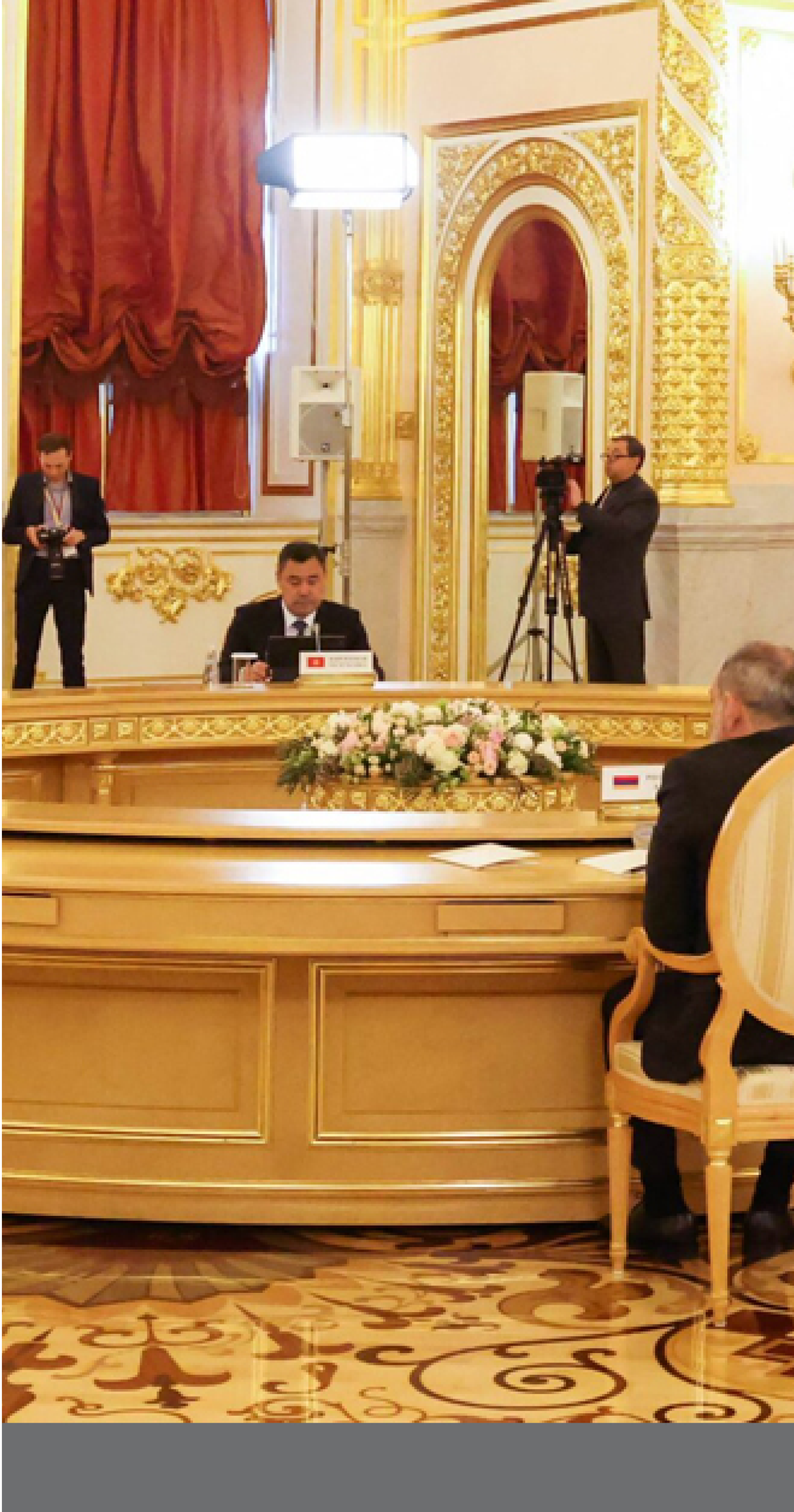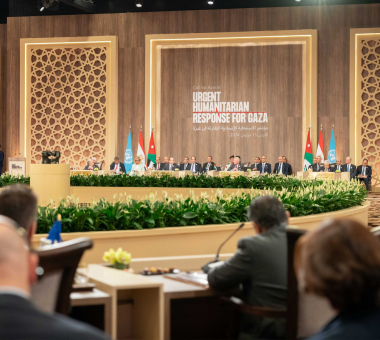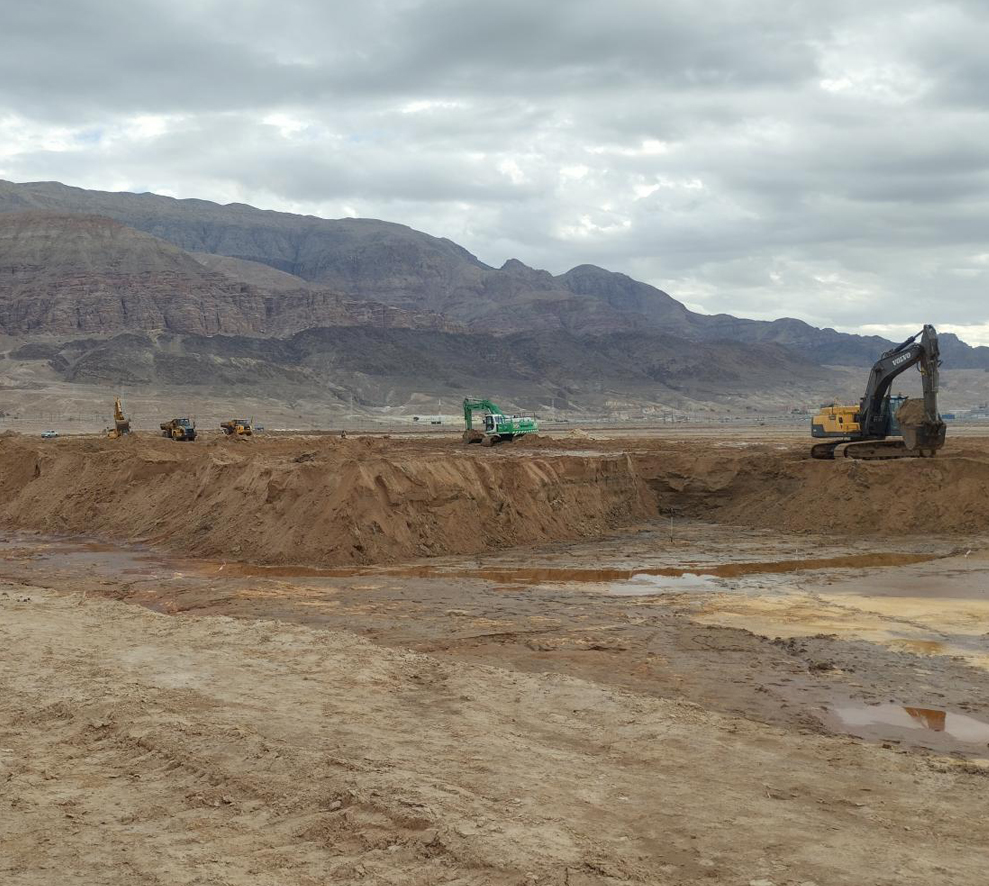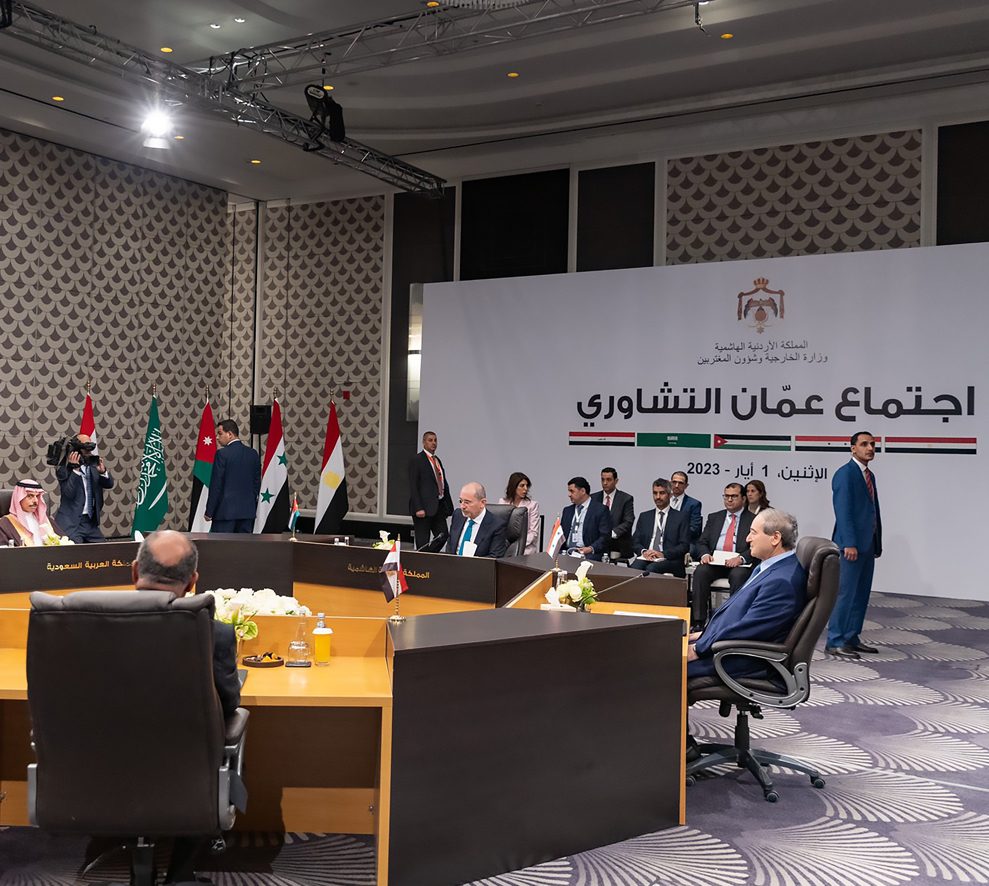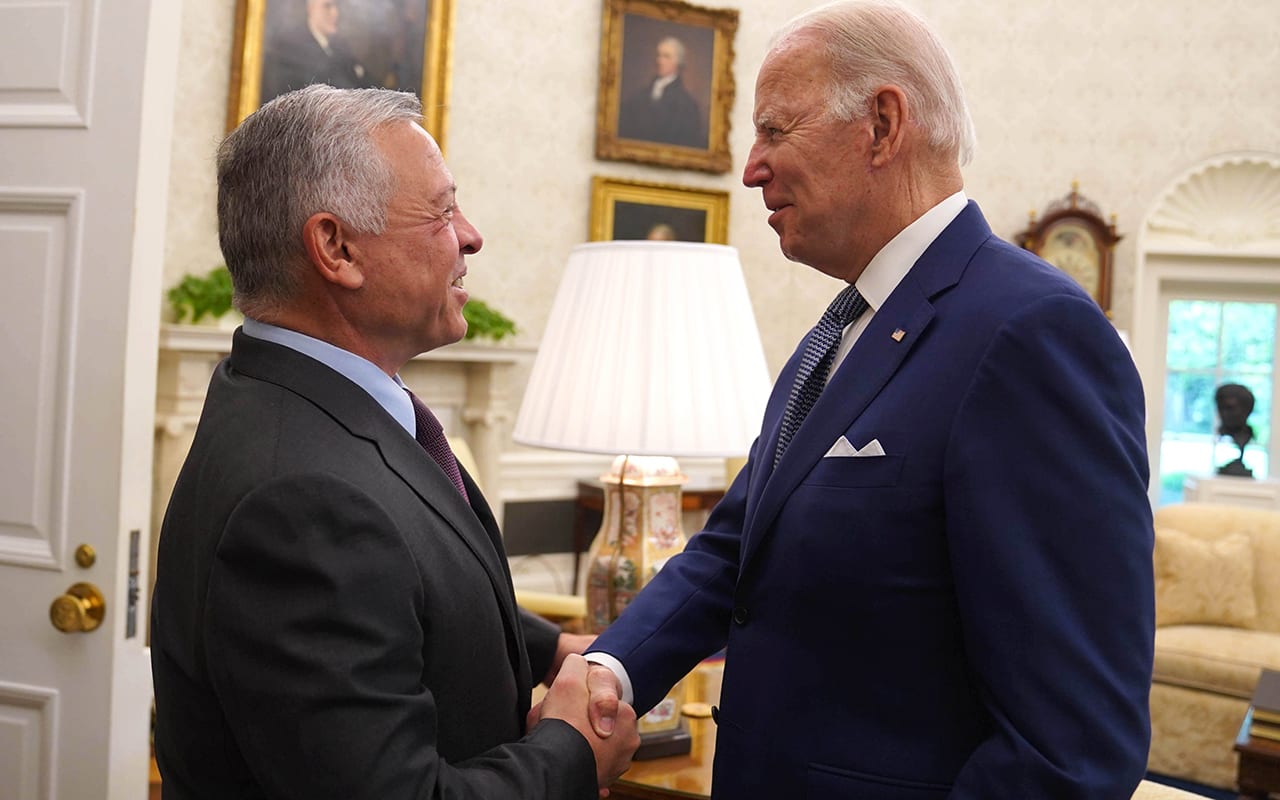For the past few years, the Jordanian diplomacy has been witnessing an active movement towers Cyprus and Greece, which are situated in the Eastern Mediterranean Basin. Three leaders-level summits were held between January 2018 to July 2021. The last summit, held in Athens, issued a "joint declaration" which indicates that a political will exists in order to deepen the inter-relations, and establish a new stage of relations. In the diplomatic norms, the joint declarations represents an indication more than the conventional press conferences do. The joint declaration came to draw a futuristic roadmap for the tripartite relations, as we will briefly discuss in this paper.
These three summits were accompanied with bilateral ministerial meetings on the economic, trade, and diplomatic levels. In December 2021, a first-of-a-kind tripartite defense summit was held at the Ministry of Defense in Cyprus, the matter which confirms that the relations across the Eastern Mediterranean-Levant triangle are to witness more comprehensive momentum.
Amman is getting involved in such relations due to the necessity of raise the level of its relations with some capitals, which share the same stand with Amman regarding semipolitical issues, and which also may push to increase the trade and investment exchange with Amman. The Jordanian relations with Cuprous or Greece, whether such relations are bilateral or tripartite, are within this tragic purpose: diverting Jordan's foreign policy choices.
In an attempt to foresee the track and nature of such tripartite relation, and whether Amman can count on them as strategic assets, we will discuss Jordan's objectives and means related to the aforesaid strategy, reviewing the regional and international environments which such movement are taking place therein.
A limited partnership, but can be built upon
As per the "Threat-Interest Model of Partnership" the relations between states are divided into 4 stages: The First Stage: a simple partnership; the Second Stage: a security partnership; the third Stage: reaching relations which motivations exceed the foreign threats, to include the economic necessities, and increasing the degree of "certainty" in mutual relations; the Fourth Stage: the "full partnership", expressing the highest level of cooperation in security and economic fields, that amounts to be classified within the strategic relations.
Projecting this model on Jordan's relations with Cyprus and Greece, we can classify these relations as ranging between the Second and Third Stages. There is a consensus over some foreign threats and diplomatic stands, and there is an effort to create an economic breakthrough to reach the Third stage. The formal Jordanian declarations and statements, ensuing the bilateral and tripartite summits, are an indication to those meetings. Amman's objectives by enhancing its relations with Cyprus and Greece can be specified through the following:
1. Networking on the Level of Gas Networks
In the past few years, many declarations about massive discoveries in Eastern Mediterranean came one after another. These discoveries exacerbated the intensity of the political disputes amongst the sea-broader countries, as the different states adopted dissimilar interpretations for the United Nations Convention on the Law of the Sea, in order to claim their rights in owning such discoveries.
It is true that Jordan is not a Mediterranean state, but Amman is seeking to occupy a place in "energy geopolitics" as a carrier for energy. The massive discoveries are searching for international and regional markets. Indeed, the Jordanian leadership was successful in managing a political effort to supply Syria and Lebanon with electric energy, via "Mediterranean" gas.
Networking on the level of gas lines is not limited on economic and material sects, rather, it expresses -in its depth- the state's vitality and dynamism of the state, and its capability to respond and adapt with the novel trends. Amman cannot be limited to follow the project of linking in vital sectors, without involving in such sectors.
This would explain why Amman joined the Mediterranean Gas Forum, in spite that it has no gas reserves neither in Jordan's lands nor in its coast on the Red Sea. This conference, which was formally declared constituted in January 2019, includes 7-member state: Cyprus, Greece, Israel, Egypt, Jordan and the Palestinian Authority.
It is worthy to not that Jordan imports a part of is gas needs from Israel. In this stage, the concerned bodies are working on making detailed studies for "the locally desalinated water for the electricity generated in Jordan". In addition, the Italian authorities are playing an important role in the works to search an extract gas at the Egyptian coasts. Therefore, a new model of energy relations is being created across the Eastern Mediterranean.
2. Deepening the Bilateral Trade and Accessing Eastern Europe Markets
Jordan's Diplomacy works on setting the atmosphere to enhance the presence of its good in Eastern Europe states. This is because the gap between such states and Jordan is less if compared with Western Europe. Greece is deemed to be a southern entrance to the Continent, making it a potential pace for the entry of Jordanian goods to Eastern Europe by sea.
His Majesty, King Abdullah II, stated at the first tripartite summit, that an agreement to cooperate within the framework of Jordan's partnership with the European Union was reached. Expressing his aspiration "to work with Cyprus and Greece to benefit from the agreement simplifying rules of origin with the European Union in developing local industries and increasing exports to Europe".
A big part of such effort's success is attributed to the technical management and the private sector. It is clear that there are no political obstacles against the Jordanian exports. However, the requirements to enter the EU markets were not met, in terms of fulfilling the specified technical and procedural standards, most important of which are related to quality, the government's control on the process of production, and its ability to regulate such process in minimum interferences.
3. Cables Diplomacy
There is an important role Cyprus is playing in the international communications and data traffic, given that it hosts a number of submarine internet cables. The island of Cyprus is considered a link point between Europe and the Middle East. The links of 14 international submarine cables end in Cyprus, the most important of which is the "SEA-ME-WE3" line, owned by the Italian company "Sparkle".
Most likely, there are joint Jordanian-Cypriot understandings, which played a role in what was announced in December 2021 during the presence of His Majesty, King Abdullah bin Al Hussein, within the framework of the projects-under-implementation in Aqaba. The Italian company and Google chose the city of Aqaba to be a main link in the submarine cable project, linking Europe, Asia, and Africa. The date of operating the submarine cable project is expected to be in 2024.
%D9%8A%D8%A8%D8%AB%D8%B5%D8%B5%D8%B5.jpg)
This partnership, which will enhance Jordan's position on the level of lining the world internet -no less significant than the regional gas link- wouldn't have been achieved without the political support.
4. Enhancing Jordan's Military Relations and Combating the International Terrorism
Greece is a member of NATO. Crete island hosts a frontal base that gives the US Navy urgent access in the eastern Mediterranean, in order to deal with the various security threats. Recently, the US Congress demands increased to deepen the military cooperation with Greece, in the face of the Turkish policies, aspiring to extract the largest possible amount of Mediterranean, seeking to impose its view on Northern Cyprus, in a manner that does not care with the clear international resolutions in this regard. Turkey's obtaining for the Russian air defense system "S-400" casts a shadow on the order of the American defense priorities in the eastern Mediterranean. So, the American military weight distanced -relatively- from Turkey, and moved towards Greece in a concentrated way.
This American orientation comes after the difficulties, which encountered the possibility of restoring US-Turkish relations. These relations were a mainstay in the US strategic mind for decades in the eastern Mediterranean, the Middle East, and the Black Sea.
In June 2021, members of the US Senate introduced the "US-Greece Defense and Parliamentary Partnership of 2021" act, which gives the Greek military the priority in acquiring the "F-35" crafts and defensive capabilities. The US Defense Spending Act of 2022 included dedicating provisions to enhance the US support for the role of Israel, Greece, and Cyprus in the eastern Mediterranean. This law came after an amendment by Washington and Athens in October 2021 in a joint defense agreement, to give the US military free access to Greek military bases.
In the same context, Amman and Washington signed a defense agreement in March 2021, which means that the Jordanian-Greek military relations are likely to develop further by virtue of the joint US ally. Jordanian fighters participated in international drills held in Greece. These drills also included regional countries.
As for Cyprus, it has been involved since 2018 in a "Security Cooperation Dialogue" with Washington. On the level of Jordanian-Cypriot military relations, these relations are potentially going to witness further progress, after the political momentum and the successive meetings of military officials, the last of which was the meeting of the Chairman of the Jordanian Joint Chiefs of Staff, Yousef Al-Huneiti, with the Chairman Staff of the Cyprus National Guard, Lieutenant- General Demokritos Zervakis, at the beginning of 2022 in the capital Amman. This meeting represented a real rapprochement, not just a military protocol meeting.
In terms of security, the three states adopt an approaching methodology based on the radical anticipatory confrontation, and exterminating the violent terrorism sources. Aqaba security meetings are deemed to be an episode on the joint security deliberations, according to formal statements after the bilateral and tripartite meetings.
5. The Palestinian Cause and the Cypriot Cause
Greece official statements emphasize supporting the Hashemite guardianship of Jerusalem's holy sites. European statements used to affirm the support for a two-state solution. But Athens takes a clear stand in showing respect for the historical role of the Hashmi in Jerusalem.
The Jordanian diplomacy is keen to attract Western and Christian support on the Palestinian cause. This diplomacy is achieving successes in this field, such as breakthrough of gaining the Cyprus and Greece support in aspects of this issue, despite Cyprus and Greece ties with Israel, which is to the credit of Jordan's "soft" diplomatic force.
On the other hand, this support for the Palestinian cause, it is noted that the recent statements of the Jordanian Foreign Ministry called for the resolution of the Cyprus "cause" as per the considerations of International Law. This confirms of the role of successful dialogue in accordance with the International Law reference and the UN resolutions in resolving Middle Eastern issues.
6. Stands and Efforts Coordination to Contain Refuge Crisis
Facing the refuge crisis, imposed by turmoil in the region, is common for Greece and Jordan. Refuge waves heading towards Europe influx through the Turkish-Greek boarders. In addition, Greece is deemed to be a favorite destination for illegal refuge traffickers, via the Mediterranean.
Therefore, Amman and Athens are coordinating the regional and international efforts to deal with the economic and security aftermath of refuge. Many international leaderships visited refuge centers in Jordan and Greece, like Pope Francis I, who directed a part from his trip to Greece, in December 2021, to visit the refugees in Lesbos Island. In his visits, he paid sharp criticism to Europe "torn by nationalist self-interest" in the issue of immigration.
-%D9%8A%D9%8A%D8%A4%D9%8A%D8%A4%D8%A4.jpg)
Cyprus and Greece support the Kingdom's plans of response to deal with the Syrian refugee crisis, by supporting grants and loans approved by the European Union. These two countries also support, financially and politically, the efforts which aim the contamination the "UNRWA" to carry out its tasks in the camps of Palestine, Jordan, and Lebanon.
Redrawing the Middle East Map
The Middle East cannot be viewed with the same old logic. In the light of the gradual American disengagement, and the increase of the Chinese and Russian presence, the Middle Eastern states are seeking to create a space for meandering in order not to fall in the dilemma of selecting, and in a manner that preserves such states' sovereignty, without an absolute affiliation to any party.
In this regard, the Jordanian state is not an exception, as it is trying to create new ties that may replace the changes that its traditional relations may undergo. Jordan is also attempting to fortify its geopolitical position, which is closely related to higher national interests.
Although Jordan is not bordering Cyprus and Greece geographically, but its relations with the two states are a part of the regional links, or -more accurately- a part of the wide vital field of Jordan. In the light of interactions flow intensity and globalization, via the cyberspace, the state's vital field concept is not restricted to the border countries anymore, rater, it expands to include the sphere leading to a state's neighboring countries.
This Jordanian tendency, towards regional networking, was stated by His Majesty King Abdullah bin Al Hussein, at the last tripartite summit (Athens, July 2021), where His Majesty estimated that "there is a possibility to build on our distinguished partnership with Iraq and Egypt, and to work jointly with the two countries to discuss the joint issues". His Majesty called the tripartite summit discussions to address Egypt and Iraq as a part of the wider regional integration.
The two countries, Egypt and Iraq, entered with Jordan the practical application of a development partnership, within the framework of an economic project. The matter that means Jordan can be a link between the counters of the Levant, regardless how far from each other, the Middle East, where their members are seeking to change the competitive nature of Middle Eastern relations, through service-economic partnerships and reducing the political inclination for these relationships.
On the contrary, such partnership are feeling that regional powers are systematically dismissing them, marginalizing their presence. Turkey is quite aware that this strategic partnership between Cyprus, Greece, and Israel would limit its economic opportunities to export the Me terranean gas. This is because this partnership includes building a pipeline from the Israeli coasts towards Cyprus, then Greece, reaching Europe.
Washington supports this partnership, because it reduces European dependence on the Russian gas and its volatile prices, depending on political conditions. In addition, Israel's possession of the lead in exporting the Mediterranean gas, means that the Iranian gas will be dismissed from Europe in the future -if the US sanctions are lifted- and that the coasts of Iran's Syrian and Lebanese allies are likely contain huge quantities of gas.
Egypt believes that the Greek-Cypriot-Israeli partnership weakens its chances of acquiring a large share of regional and international gas exports, even though the four countries have extensive security, military and economic relations, and even if they are united by many factors, including the combating terrorism.
So, there is a covert large-scale clash on the shores of the Mediterranean. Unless all parties are convinced of the need to reach consensual solutions, in which one party does not feel that it has been excluded, the Mediterranean gas will become a factor of regional aggravation. Some estimates believe that the Mediterranean has already become one of these factors, but It is too early to say that the countries concerned will fail to adopt a win-win solution.
Due to such facts, Jordan cannot be satisfied with seeing these transformations in the region, without taking the initiative to take a position, and occupy an advanced position in the redrawn map of the Middle East, according to regional and international linking projects. Also, the strategic weight of the Middle East is shifting towards the Eastern Mediterranean, away from the Strait of Hormuz, which witness many tensions.
Based on the foregoing, it is clear that there is a political will between the three states to deepen cooperation aspects. Nevertheless, there is a long track of the required work, on the technical level, to translate such will into reality. Besides that Cyprus and Greece cannot afford Jordan a strategic support. Also, Jordan, with its limited capabilities, can't be one of Cyprus and Greece priorities.
Trade indicators show that Oman’s relations, with Cyprus and Greece, are still in the process of being established. Jordanian exports to these two countries did not exceed $20 million in 2019. In addition, full diplomatic relations between Jordan and Cyprus were not inaugurated until 2016. As stated in the introduction to the first clause, Jordan's relations with Cyprus and Greece will remain between the second and third phases in the short-medium term.
Hence, Jordan does not count on its expanding interactions in the Mediterranean basin, to be a substitute for its traditional existing relations. Rather, the goal is to diversify the foreign policy options, prepare for extreme scenarios, and attract economic advantages.
What is certain for researchers in Jordanian foreign policy, that Jordan plays its role when it comes to hard policy and security. But a lot of work is needed to deepen the economic interactions from and to and the Kingdom. This is an issue in which the private sector and advisory institutions must play a role. The growth of the trilateral relationship is likely to face political constraints.
What is significant in these relations is that they take place on the global line, separating the south and the north: the poor south, which is the source of crises and refugees, and the rich north, which is the source of technology and luxury. Thus, the three countries can establish a platform for a global dialogue between the north and the south, in a way that bridges the differences in perceptions and impressions between peoples, and paves the way towards regional cooperation that replaces the zero-sum competition, that motivates more conflicts in the greater Middle East, with its Arabian Gulf, Mediterranean, Near East, and North Africa.
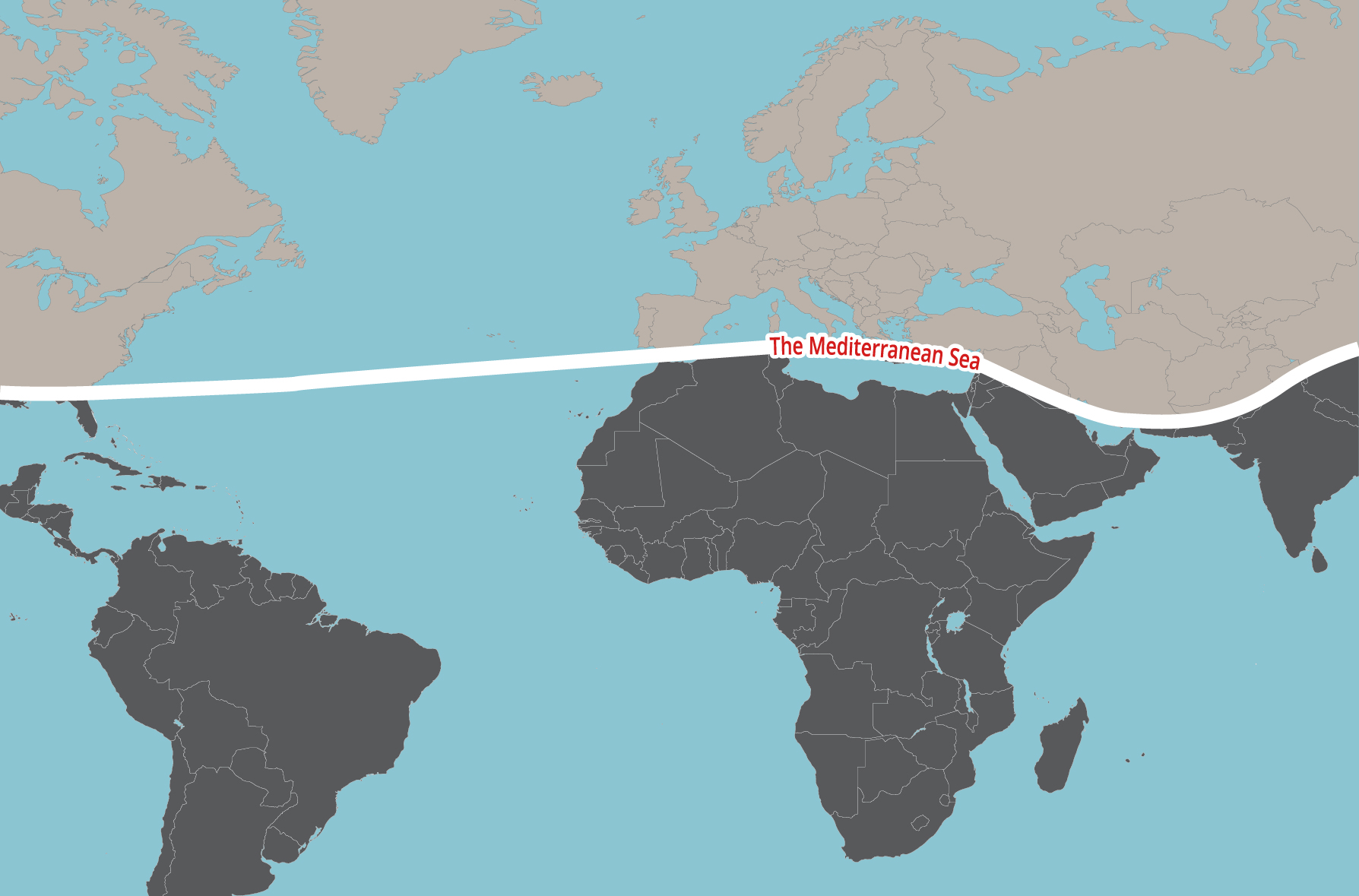
To enhance the chances of success of Jordanian diplomacy in developing relations with Greece and Cyprus, the following can be considered:
1- To increase the pace of economic, cultural, and tourism interactions. And to agree that these interactions will not be affected by any political disputes that may arise in the future, especially the stands related to the Cyprus cause and the Palestinian cause.
2- To Prepare for advanced partnerships, in the technological sector, between Jordan and Cyprus. And to transfer expertise in the field of cybernetics to Jordanian technology companies. This growing sector in Jordan can benefit from several advantages in Cyprus, such as its regional and global location, as a link for internet cables, and the presence of several important technology companies there.
3- To intensify the efforts to relate the tripartite relations (Jordan, Greece and Cyprus) with the economic outcomes of the tripartite partnership between Jordan, Egypt and Iraq. And to work so Jordan would be a logistical port for Cyprus and Greece, to Iraq and Syria (in later circumstances), which may lead to an increase in Jordanian exports to Cyprus and Greece.
4- To integrate of Cyprus and Greece into Middle Eastern files. And Oman's practice of more Arab-Mediterranean interdependence, in coordination with Egypt. There are many factors of convergence, and common challenges that a unified action can contribute in addressing them, for the benefit of all parties.
5- To clarify the official Jordanian intentions and objectives of these relations, so that their development would not result in the deterioration of Jordanian relations with other countries, that do not have cooperative relations with Greece and Cyprus.
6- To agree on a form of continuous military coordination between the three countries. And to institutionalize this coordination to attract more American attention to the three countries, as focal points in the American strategy in the greater Middle East.
Keep in touch
In-depth analyses delivered weekly.

Related Analyses:







